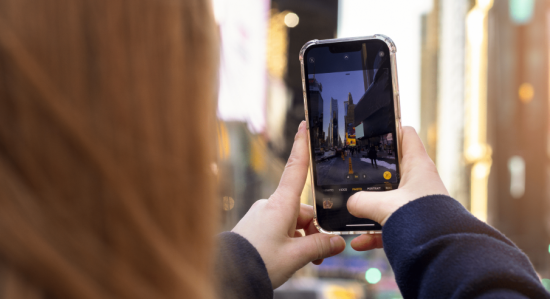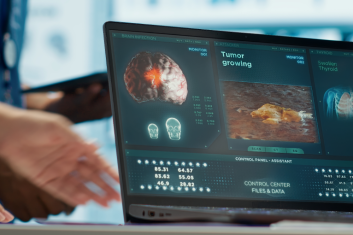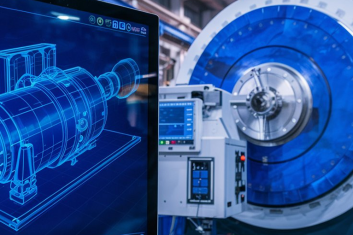Virtual Reality (VR) in the hospitality industry is one of the newest and most promising tools for creating immersive demonstrations of tourist destinations, resorts, hotels, and other attractions. Full immersion, high-quality images, wide opportunities to demonstrate tourist sites and attractions — all of this makes VR a powerful marketing tool today.
Augmented Reality (AR) in tourism allows for supplementing a real environment with information and effects, enriching the experience of tourists when visiting attractions and historical sites. AR is used to create interactive games, applications and shows that combine the real world with virtual objects and effects.
Benefits of VR and AR in Tourism and Hospitality
Immersive travel experiences
Now travelers can tour historic monuments, museums, and even cities without leaving their homes. Virtual Reality in the hospitality industry allows users to immerse themselves in the atmosphere of other times and places as if they were physically there. AR-enabled smartphones can provide additional information about attractions, history, and culture on the spot.
Enhanced guest engagement
Enhanced guest engagement through VR and AR in the hospitality industry allows hotels and resorts to offer immersive experiences, such as virtual room tours or interactive property maps. These technologies provide guests with more personalized and memorable interactions, increasing their satisfaction and the likelihood that they’ll book again.
Increased bookings and conversions
By providing interactive and immersive experiences, AR and VR can boost customer engagement and build trust, leading to higher conversion rates and increased bookings. This not only enhances customer satisfaction but also strengthens brand loyalty and generates positive feedback, encouraging more customers to choose your services.
Virtual travel planning and exploration
VR in hospitality and tourism allows people to virtually explore attractions, hotels, and other destinations. This can help independent travelers get a better idea of what to expect, which helps when planning a trip. By virtually visiting places beforehand, travelers can make more informed choices about where they want to go and what accommodations to book.
Applications of AR and VR in the Tourism and Hotel Industry
Virtual Reality tours of destinations and hotels
VR tours offer immersive previews of destinations and accommodations, allowing potential visitors to:
- Explore hotel rooms and amenities
- Experience local attractions virtually
- Get a 360-degree view of landscapes and cityscapes
This technology helps users make an informed decision and builds excitement for upcoming trips.
Augmented Reality for interactive city guides
Augmented Reality city guides enhance real-world exploration by overlaying digital information onto physical surroundings. Features include:
- Historical facts about landmarks
- Restaurant reviews and menu translations
- Directional arrows for navigation
This interactive experience enriches sightseeing and helps tourists discover hidden gems.
VR for virtual booking and reservations
VR booking platforms allow users to:
- Virtually walk through hotel rooms before booking
- Explore multiple accommodation options in detail
- Visualize amenities and surrounding areas
This immersive booking experience increases customer confidence and reduces booking cancellations.
AR for in-room guest services and information
AR for in-room guest services and information provides a seamless and interactive way for guests to:
- Access amenities
- Order room service
- Explore hotel facilities
By using their smartphones or AR devices, guests can view digital overlays with detailed information, enhancing convenience, personalizing their stay, and elevating the overall guest experience.
Virtual conferences and events
Virtual Reality enables remote participation in:
- Trade shows and exhibitions
- Business conferences
- Cultural festivals
This application expands event reach, reduces travel costs, and offers unique networking opportunities in virtual spaces.
VR in travel planning and itinerary building
Virtual Reality assists in trip planning by allowing travelers to:
- Virtually visit multiple destinations
- Test different itineraries
- Experience activities and tours in advance
As a result, tourists get more satisfying and personalized travel experiences.
Why You Need a Custom AR/VR Software Solution
-
Tailored solutions for specific hospitality needs
In the hospitality industry, providing unique and immersive experiences is key to attracting and retaining guests. Custom AR/VR solutions are specifically designed to meet the unique challenges of hospitality businesses, such as virtual room tours, interactive guest experiences, and staff training simulations, enhancing guest satisfaction and operational efficiency.
-
Integration with existing hospitality systems
Custom AR/VR solutions are built to integrate seamlessly with existing hospitality systems, such as property management systems (PMS), booking platforms, and customer relationship management (CRM) tools. This integration enables streamlined operations, enhances data consistency, and improves overall guest service by providing a unified and efficient technological ecosystem.
-
Optimized performance and scalability
Custom-developed AR/VR software is optimized for performance, ensuring that your application runs smoothly and efficiently. Additionally, our solutions are built with scalability in mind, allowing your business to expand and adapt the software as needed, without facing limitations or requiring a complete overhaul.
-
Competitive advantage through Innovation
Investing in a custom AR/VR solution from HQSoftware positions your business at the forefront of technological innovation. By offering a unique and personalized user experience, you differentiate yourself from competitors, attracting more customers and retaining their loyalty in a competitive market.
Key Features of a Custom AR/VR Tourism Solution
High-quality visual and audio experience
Custom AR/VR solutions deliver immersive, high-quality visual and audio experiences that mesmerize users. Using advanced graphics and sound technologies, the applications we develop create realistic environments and lifelike soundscapes. This ensures that each user is truly immersed in the experience, whether exploring a virtual museum or touring a city.
User-friendly interface for guests and staff
A well-designed, intuitive interface is crucial for both guests and staff to navigate AR/VR experiences seamlessly. At HQSoftware, we prioritize ease of use, minimizing learning curves and enhancing accessibility. This ensures that users of all technical abilities can enjoy the full benefits of the AR/VR application without confusion or frustration.
Compatibility with multiple devices
To maximize accessibility, custom AR/VR tourism solutions are compatible with a wide range of devices, including smartphones, tablets, VR headsets, and desktop computers. This multi-platform compatibility allows users to engage with the content in the way that best suits their needs and preferences.
Interactive and engaging content
At HQSoftware, we develop AR/VR solutions designed to deliver interactive and engaging content that keeps users actively involved. From gamified tours and quizzes to immersive storytelling and interactive exhibits, custom applications encourage exploration and participation, creating memorable experiences that leave a lasting impression on visitors.
Steps to Implementing AR and VR in Tourism and Hospitality

Comprehensive analytics
At HQSoftware, we begin by gathering and analyzing data on your target audience and their preferences. This step helps identify the most impactful use cases for AR/VR, ensuring the solution aligns with your business goals.Prototyping
Next, the HQSoftware team creates a prototype to visualize how the AR/VR solution will function. This step allows for testing and refinement of concepts, ensuring the final product meets user expectations and business needs.Design
Then we develop a detailed design for the AR/VR application, focusing on user experience and interface. This phase includes creating visual assets and defining user interactions to ensure an intuitive and engaging experience.Development
The development phase involves HQSoftware building the AR/VR solution, using advanced technologies and tools. This includes coding, integrating features, and thorough testing to ensure the application functions smoothly across all intended devices and platforms.Project launch
HQSoftware launches the AR/VR solution, ensuring a smooth deployment across all platforms. This step includes monitoring the solution’s performance, collecting user feedback, and making necessary adjustments to optimize the experience and achieve desired outcomes.
Industries We Serve
See what our virtual and augmented reality app developers can do for your business
Education
Simulations of education labs, AR/VR tutorials, virtual trips, recreations of historical scenes.
Manufacturing
Interactive guides to help train employees, test and maintain equipment, build prototypes to evaluate new components.
Marketing
Interactive 3D models of products and holograms equipped with audio, video, buttons.
Healthcare
Safe AR/VR environments for students to learn, AR-based interfaces for medical equipment.
Real estate
Virtual guided tours around buildings with interactive 3D objects superimposed over a physical scene in real time.
Retail
Collection showcasing, virtual dressing rooms, virtual assistants, in-store navigation.
Automotive
AR/VR in the automotive industry enhances vehicle design, manufacturing, and customer experiences by enabling virtual prototyping, immersive training, and interactive car showrooms.
Sports
AR/VR-powered training programs, VR live streaming, Big Data and IoT for unique fan experiences.
Entertainment
Full-presence and immersive experiences for cinemas, TV shows, games, theaters.
Agriculture
Crop monitoring, training, and precision farming, offering immersive visualization, real-time data, and remote assistance.
Tourism
Immersive AR/VR virtual tours of destinations, landmarks, and attractions, enabling travelers to explore and plan trips remotely.
Telecom
AR and VR enhance network management with real-time data overlays for maintenance efficiency, immersive customer service, and employee training in the telecom sector.
How to Start a Virtual Reality Software Project
Easy steps to start a partnership with us
Have no specifications?
Start an elaboration stage with us.
Want a test period?
Let’s start with a pilot project of 2-4 weeks.
Confident and ready to start?
Let’s get your software project running.
FAQs
What are the advantages of VR and AR in tourism?
How is Virtual Reality affecting tourism marketing?
What is VR tourism?
Can VR replace tourism?
How long does it take to develop a custom AR/VR solution for tourism?
What is the impact of VR/AR on the hospitality industry?
We are open to seeing your business needs and determining the best solution. Complete this form, and receive a free personalized proposal from your dedicated manager.

Sergei Vardomatski
Founder





